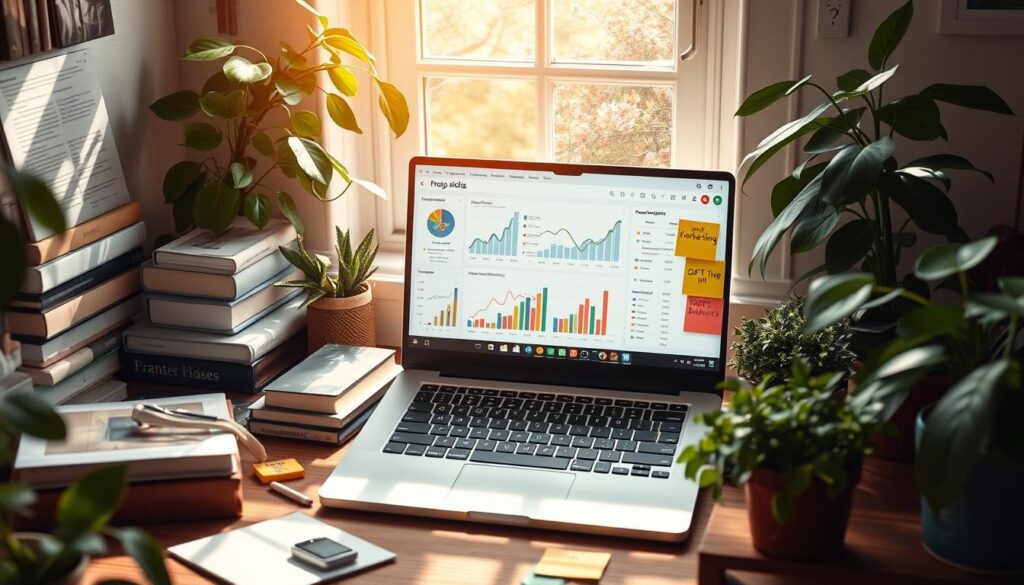As a website owner, I know how vital search engine optimization (SEO) is. It helps drive organic traffic and boosts your online presence. SEO makes your website easier for search engines like Google to find. This way, you can climb the ranks and reach more people1.
SEO helps search engines grasp what your website is about. By using keyword research, on-page optimization, and technical SEO, your site becomes both user-friendly and search engine-friendly1.
While there’s no surefire way to get indexed right away, following best practices can help a lot. Google’s crawlers are always on the lookout for new content. By optimizing your site, you make sure your content is found and ranked higher1.
Key Takeaways
- SEO helps search engines understand your website content and improve its visibility in search results.
- Conducting a comprehensive site audit can identify technical SEO issues and uncover opportunities for improvement.
- Utilizing keyword research tools can aid in building a comprehensive list of relevant keywords to target.
- Optimizing on-page elements, such as content, metadata, and links, can enhance your website’s search engine rankings.
- Regularly updating and maintaining your website’s content is crucial for keeping it fresh and relevant.
Understanding SEO Optimization Basics
Search engine optimization (SEO) makes a website more visible and ranked higher in search results. This helps more people find it2. It’s key for any online marketing plan, boosting traffic and brand awareness. Knowing SEO basics helps businesses stay ahead in the digital world.
What is SEO?
SEO is about making a website better for search engines. It uses techniques like keyword research and content optimization3. The goal is to make the site more appealing to search engines, increasing its visibility and traffic.
Importance of SEO for Websites
SEO is vital for any website’s success2. It boosts visibility and improves user experience, leading to more engagement and sales3. Good SEO helps businesses rank higher, get more organic traffic, and lead the market.
SEO covers many areas, from on-page optimization to off-page strategies4. Mastering these aspects helps website owners use search engines for growth and success.
“SEO is not just about getting traffic – it’s about getting the right kind of traffic.” – Rand Fishkin, Co-founder of Moz
| Keyword | Search Volume | Difficulty |
|---|---|---|
| Royal Canin dog food | 49,500 | 81% |
| Royal Canin hydrolyzed protein dog food | 1,900 | 39% |
Understanding search engine algorithms helps create content that meets audience needs4. This leads to better rankings, more visibility, and quality leads for businesses.
Key Components of SEO Optimization
SEO is more than just a few tricks. It’s about using on-page, off-page, and technical SEO to make your site better. By doing this, you can get more people to visit your site and rank higher in search results.
On-Page SEO Techniques
On-page SEO makes your web pages better for search engines. It’s about making your content great, using the right keywords, and managing your meta tags well. Good content and the right use of tags can really help your site do well in searches5.
Off-Page SEO Strategies
Off-page SEO looks at things outside your site that help it look good. Getting good backlinks is key. Also, being active on social media can help your site’s SEO6.
Technical SEO Essentials
Technical SEO is about making your site easy for search engines to understand. This means making your site fast, mobile-friendly, and easy to navigate. Good technical SEO is the base of a strong SEO plan7.
| SEO Component | Key Factors |
|---|---|
| On-Page SEO |
|
| Off-Page SEO |
|
| Technical SEO |
|
By focusing on these main parts of SEO, you can make a solid plan. This plan will help your site get more visitors, be more visible online, and lead to more business success.
Importance of Keyword Research
Keyword research is key to a good SEO plan. It helps you know what people search for when looking for your stuff. This way, you can make your content better and get more seen online8.
Good keyword research looks at how often people search, how competitive it is, and what they really want to find.
Tools for Effective Keyword Research
There are many tools to help with keyword research. Google Keyword Planner is free and shows you search volume and keyword difficulty910. SEMrush and Ahrefs have more features like competitor analysis and semantic search.
Long-Tail vs. Short-Tail Keywords
Long-tail and short-tail keywords are different. Long-tail keywords are longer and less searched but more likely to convert98. Short-tail keywords are shorter, more searched, but harder to rank for108.
Mixing both types in your content can help you reach more people and get more visitors to your site8.
“Keyword research is the foundation of any SEO and SEM marketing campaign.”8
Crafting Valuable Content for SEO
In digital marketing, content is key to SEO success. Making high-quality content that meets user needs is vital for better website rankings11. The founder of AIContentfy said, “We grew to 100k/mo visitors in 10 months with AIContentfy,” showing content’s power11.
Content Quality and Relevance
Creating valuable content is crucial. It should be authoritative, unique, and informative, targeting your audience12. Google values content that helps users, so knowing their needs is essential12. Making buyer personas can boost your SEO content’s success11.
Using SEO Best Practices in Writing
Using SEO best practices in your writing can make your content more visible and impactful11. Proper use of H1, H2, and H3 tags helps search engines understand your content’s structure11. Using your target keywords wisely can also improve your rankings11. Engaging headlines and optimized meta tags can increase your web page’s visibility and clicks11.
Content marketing is a continuous effort. Regularly update your content and stay in tune with user intent12. Using E-A-T (Expertise, Authoritativeness, Trustworthiness) principles can make your content more SEO-friendly and engaging12.

| Technique | Benefit |
|---|---|
| Keyword Research | Identifies relevant keywords to target for improved search visibility11 |
| Structured Content | Enhances readability and user experience through clear headings and formatting13 |
| Mobile Optimization | Ensures content is accessible and engaging on mobile devices, catering to a significant portion of web traffic13 |
| Fresh Content | Signals search engines that the site is active and aligned with user needs, improving indexing and rankings13 |
By following these content marketing best practices, you can create content that ranks well and engages your audience12.
“Content is the foundation of successful SEO. Focus on creating valuable, relevant, and engaging content that addresses your audience’s needs.”
The Role of Meta Tags in SEO
Creating a strong online presence starts with knowing about search engine optimization (SEO). Meta tags play a key role here. They give search engines and users important info about your web pages14.
Title Tags
Title tags are vital for SEO. They show up as the headline in search results. It’s best to keep them short, use key words, and match what users are looking for15.
Optimizing your title tags can make your site more visible in search results. This can also get more people to visit your site14.
Meta Descriptions
Meta descriptions don’t directly affect your ranking. But, they can really help get more people to click on your site. Google might show them to make your site more appealing14.
For the best results, keep your meta descriptions between 70-155 characters. This lets you write short, engaging summaries of your page15.
Using the right keywords, a clear call-to-action, and unique descriptions for each page can boost your meta descriptions. This can lead to more visitors to your site14.
By using meta tags wisely, you can improve your site’s visibility in search results. This can also increase the number of visitors to your site1415.
Building a Strong Backlink Profile
In the world of SEO, backlinks are very important. They are like votes of confidence from other websites. These votes can really help your site rank better in search engines16. Getting high-quality backlinks from trusted sites in your field can boost your site’s authority and make it more visible online.
Understanding Backlinks
Backlinks are key for a few reasons. They help search engines find and list your content faster17. Also, links from respected sites can improve your site’s authority, which is vital for rankings16. Having a strong backlink profile can give you an edge over your competitors in search rankings17.
Techniques for Acquiring Quality Backlinks
To build a strong backlink profile, you need a variety of strategies. Here are some effective ones:
- Create valuable content like blog posts or infographics that others will link to16.
- Look for guest posting chances on sites related to your field to get quality backlinks17.
- Find broken links on other sites and offer your content as a replacement16.
- Do digital PR to get editorial backlinks from trusted sources17.
It’s more important to have quality backlinks than a lot of them17. Aim for backlinks from sites that are trusted, authoritative, and relevant to your field and audience16. By using these methods, you’ll improve your site’s search rankings and visibility.

Mobile Optimization and SEO
In today’s world, having a website that works well on mobile is essential. Over 60% of people now search online using their phones18. Google’s focus on mobile-first indexing18 shows how important it is to meet mobile users’ needs.
Importance of Mobile-Friendly Websites
More people use smartphones to shop and research19. So, businesses need to make sure their websites work well on mobile. A good mobile site improves user experience and can increase sales20. Plus, Google values fast-loading pages, making mobile speed crucial18.
Tools for Mobile SEO
There are many tools to help make websites mobile-friendly19. Google’s PageSpeed Insights and SEMrush’s mobile checks offer insights for improvement20. Google suggests using responsive design, which adjusts to any screen size18.
For faster mobile sites, Accelerated Mobile Pages (AMP) can help a lot20. AMP pages load quickly and rank better in search results20. Also, optimizing for local search on mobile is key for businesses with a physical location.
By focusing on mobile optimization and using the right tools, businesses can thrive in the changing SEO world181920.
| Metric | Desktop | Mobile |
|---|---|---|
| Bounce Rate | 35% | 42% |
| Load Time | 2.5 seconds | 1.8 seconds |
| Conversion Rate | 4.2% | 3.7% |
“Responsive design is recommended for mobile SEO by Google as it allows for better user experience, reduces common mistakes, and saves resources during crawling.”
The Impact of Site Speed on SEO
Page load time is key for website rankings and conversion rates in 202421. Many things affect page speed, like Time to First Byte (TTFB) and Time to Interactive (TTI)21. First Contentful Paint (FCP) and Load Time are also important for user experience21.
Page speed varies based on website type and goals, not just industry standards21. Site speed and SEO are closely linked, with faster pages improving user experience and rankings21. Common issues include code overhead, media assets, and server performance21.
Tools to Measure Website Speed
Google PageSpeed Insights is a free tool for analyzing website speed21. GTmetrix, Pingdom, and WebPageTest also offer detailed reports on website performance22. These tools help improve page speed for better user experience and SEO22.
Techniques for Improving Load Times
Optimal web hosting and static site generation can boost page speed21. Image compression, WebP conversion, caching, and code minification also help21. These methods tackle common speed issues21.
| Metric | Importance | Benchmark |
|---|---|---|
| Largest Contentful Paint (LCP) | Measures the time it takes for the largest content element on the page to load. | Good: Less than 2.5 seconds, Needs Improvement: 2.5 to 4 seconds, Poor: More than 4 seconds |
| First Input Delay (FID) | Measures the time it takes for a page to become interactive. | Good: Less than 100 milliseconds, Needs Improvement: 100 to 300 milliseconds, Poor: More than 300 milliseconds |
| Cumulative Layout Shift (CLS) | Measures the visual stability of a page, quantifying the amount of unexpected layout shift. | Good: Less than 0.1, Needs Improvement: 0.1 to 0.25, Poor: More than 0.25 |
Google’s Core Web Vitals, like Largest Contentful Paint (LCP) and First Input Delay (FID), are key for measuring user experience22. They provide insights for website optimization22.
While tools like Google PageSpeed Insights are useful, their scores don’t fully determine SEO success23. High scores don’t always mean better rankings, showing SEO’s complexity23.
“Most visitors leave a website if it doesn’t load within 3 seconds, emphasizing the importance of page speed for user retention.”22
In summary, page speed is vital for both user experience and SEO. By using tools and improving load times, website owners can enhance their performance and search engine rankings.
Local SEO: Reaching Your Community
As a business owner, it’s key to grasp the role of local SEO today. It makes your business seen by people in your area. This way, you can reach those who might need what you offer24.
Importance of Google My Business
Google My Business (GMB) is a vital part of local SEO. It’s free and lets you manage your online presence on Google. Keeping your GMB updated with the right info and engaging content boosts your local search visibility25.
Local SEO Strategies
There are many ways to improve your local SEO. Make sure your NAP info is the same everywhere online26. Ask customers for reviews and create content that’s specific to your area24. Working with local brands and joining in on community talks can also help24.
For better local SEO, use social media that’s focused on your area. Also, choose a web host like UltaHost that’s near your target market24. A solid local SEO plan can help you connect with your community, gain trust, and grow your business24.
“Local customer research, engagement, and collaboration can establish a business as a local hub of activity.”24
| Local SEO Factor | Impact |
|---|---|
| Localized Content | Increases relevance and visibility in local search |
| Local Link Popularity | Signals authority and trust to search engines |
| Google My Business Listing | Enhances online presence and local pack inclusion |
| Local Citations | Improves NAP consistency and search engine trust |
| Review Signals | Boosts credibility and customer trust |
Measuring SEO Success
It’s key to track important indicators to see how well your SEO works. Look at organic traffic, keyword rankings, conversion rate, and search visibility. This helps you make smart choices to boost your ROI measurement.
Key Performance Indicators (KPIs)
Organic traffic shows how many people visit your site from search results. It shows if your site is doing well in attracting visitors27. Seeing how you compare to others can help you spot what to improve27.
Watching your keyword rankings is also vital. It shows where your site stands in search results, affecting how many people visit27. Keeping an eye on this helps you see if your SEO is working and what to tweak27.
SERP visibility matters too. It shows how often and how well your site shows up in search results27. Also, how many times your site is seen in results is key to knowing your SEO’s success27.
The click-through rate (CTR) shows how many people click on your site from search results2728. Conversions, like when people buy or sign up, show how well your SEO is working27.
Lastly, bounce rate is important. It shows how many people leave your site quickly2728. A high bounce rate might mean your site is slow or not mobile-friendly2728.
Tools for SEO Analytics
Use tools like Google Analytics, Google Search Console, and SEO platforms like SEMrush or Ahrefs28. These tools give you deep insights into your site’s performance. They help you track your progress, see what your competitors are doing, and make smart choices to improve your search visibility and ROI measurement.
Staying Updated with SEO Trends
As an SEO enthusiast, I understand the importance of keeping up with the latest trends. The SEO world is always changing, with search engines like Google updating their algorithms often. These updates aim to give users the best and most reliable content29. To keep my website competitive, I focus on learning and updating my strategies regularly.
Importance of Continuous Learning
In the fast-paced world of SEO, continuous learning is key29. The latest algorithm updates have made author entities more important for content rankings29. Also, the use of AI tools for SEO tasks has grown a lot in 202329. By keeping up with these changes, I can improve my content and optimization methods.
Resources for SEO News and Updates
To stay ahead, I use trusted sources like Google’s Webmaster Central Blog, Search Engine Journal, and Moz30. These platforms offer insights into algorithm updates, industry studies, and expert tips. They help me adjust my strategies. I also attend SEO conferences and webinars to learn from others and network.
FAQ
What is SEO and how does it work?
Why is SEO important for websites?
What are the key components of SEO optimization?
Why is keyword research important for SEO?
What makes high-quality content important for SEO?
How do meta tags impact SEO?
Why are backlinks important for SEO?
How does mobile optimization affect SEO?
How can I measure the success of my SEO efforts?
How can I stay up-to-date with the latest SEO trends?
Source Links
- SEO Starter Guide: The Basics | Google Search Central | Documentation | Google for Developers – https://developers.google.com/search/docs/fundamentals/seo-starter-guide
- SEO Basics: How to Do SEO for Beginners – https://www.semrush.com/blog/seo-basics/
- SEO Basics: Beginner’s Guide to SEO Success – https://ahrefs.com/blog/seo-basics/
- SEO Basics: A Beginner’s Guide to SEO | WordStream – https://www.wordstream.com/blog/ws/2015/04/30/seo-basics
- What Are the 4 Components of SEO? – https://www.demandjump.com/blog/what-are-the-4-components-of-seo
- 7 Essential SEO Elements for Better Rankings – https://www.webfx.com/blog/seo/seo-elements/
- 4 pillars of effective SEO – https://searchengineland.com/pillars-effective-seo-strategy-435823
- 5 Key Reasons Why Keyword Research is Important for SEO – https://www.seoptimer.com/blog/why-is-keyword-research-important/
- Why Is Keyword Research So Important? – https://www.woorank.com/en/blog/keyword-research-important
- What Are Keywords & Why Are They Important for SEO? – https://moz.com/learn/seo/what-are-keywords
- The Art of Crafting SEO-Optimized Content: Best Practices and Strategies – https://aicontentfy.com/en/blog/art-of-crafting-seo-optimized-content-best-practices-and-strategies
- BruceClay – Crafting High-Quality SEO Content: A Comprehensive Guide – https://www.bruceclay.com/blog/high-quality-seo-content-guide/
- Content Creation and SEO: Crafting Engaging Content that Ranks – https://www.nobledesktop.com/learn/seo/content-creation-and-seo-crafting-engaging-content-that-ranks
- Meta Tags: What They Are & How to Use Them for SEO – https://www.semrush.com/blog/meta-tag/
- Meta Tags in SEO: The Ultimate Guide – https://www.conductor.com/academy/what-are-meta-tags/
- Building Links 101: A Comprehensive Guide to Backlinking + Boosting Your SEO | Responsival – https://www.responsival.com/post/building-links-all-you-need-to-know
- How to Build a Strong Backlink Profile – https://aicontentfy.com/en/blog/how-to-build-strong-backlink-profile
- The Complete Guide to Mobile SEO: 8 Tips & Best Practices – https://www.semrush.com/blog/mobile-seo/
- The DIY Mobile SEO Guide: How to Be Mobile-First in 2024 – https://optinmonster.com/mobile-seo/
- Mobile SEO: A Guide to Mobile Optimization – https://moz.com/learn/seo/mobile-optimization
- How important is page speed for SEO in 2023? – https://www.edgeoftheweb.co.uk/blog/importance-of-page-speed
- How Does Page Speed Affect SEO? » GOODMAN CREATIVES – https://goodmancreatives.com/how-does-page-speed-affect-seo/
- How Page Speed Affects SEO & Google Rankings | The 2024 Page Speed Guide – https://cognitiveseo.com/blog/22865/page-speed-seo/
- Local Search Optimization: A Guide to Getting More Reach in Your Neighborhood – https://ultahost.com/blog/local-search-optimization-a-guide-to-getting-more-reach-in-your-neighborhood/
- What is Local SEO, and How Does It Work? | Mailchimp – https://mailchimp.com/resources/what-is-local-seo/
- A Comprehensive Guide to Local SEO in 2023 – https://blog.hubspot.com/marketing/local-seo
- SEO Results: How to Track & Measure SEO Performance – https://www.semrush.com/blog/seo-results/
- How to Measure the Success of Your SEO Strategy – https://www.benchmarkemail.com/blog/measure-success-seo-strategy/
- SEO Trends in 2024 and How to Adapt – https://backlinko.com/seo-this-year
- 17 New SEO Trends to Look for in 2025 – https://www.stanventures.com/blog/seo-trends/


